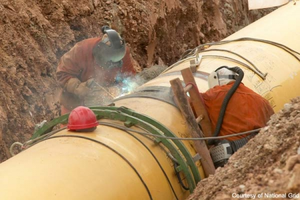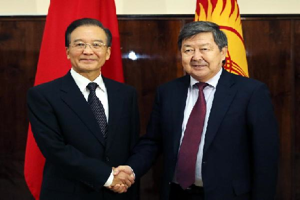CACI Analyst, May 01, 2013
China Deepens Energy Cooperation In Central Asia
by Robert M. Cutler (05/01/2013 issue of the CACI Analyst)
Days after the conclusion of the late-March summit in Moscow between Russia’s President Vladimir Putin and his Chinese counterpart Xi Jinping, Kazakhstan’s President Nursultan Nazarbaev met with Xi during a visit to China to attend the multilateral Boao Forum of Asia (BFA), which styles itself the Asian Davos. The two leaders established a new bilateral business council, signed numerous agreements for economic cooperation including infrastructure construction, and deepened still further Chinese participation in the development and bringing-to-market (and especially bringing-to-China) of Kazakhstan's impressive raw materials resources, most of all energy.

CACI Analyst, April 17, 2013
Nazarbayev Visits China To Meet Its new Leadership
by Georgiy Voloshin (04/17/2013 issue of the CACI Analyst)
On April 6, Kazakhstan’s President Nursultan Nazarbaev paid an official visit to the People’s Republic of China where he met with the new Chinese leader Xi Jinping to discuss the state of bilateral relations between Astana and Beijing. As Nazarbaev recalled during his interview for China Daily, the strengthening of the Kazakhstani-Chinese partnership remains one of the priorities of the “Kazakhstan-2050” strategy unveiled in late December 2012.
Kyrgyzstan Between China And Russia
by Dmitry Shlapentokh (04/17/2013 issue of the CACI Analyst)
China’s new President Xi Jinping has underlined the crucial importance of China’s relationship with Russia and proclaimed that Russia would be his first foreign destination. Yet, despite mutual assurances and common interests in some areas, China and Russia also increasingly compete in Central Asia, not least in their approaches to Kyrgyzstan. In 2012, Kyrgyz authorities signed several agreements with both Russia and China. Agreements with Russia primarily stress military strategic matters, while those with China emphasize economic ties that, barring major conflict in the area, will be more important than military help for Kyrgyzstan. Hence China, not the U.S. or Turkey, is emerging as Russia’s major competitor for influence in Kyrgyzstan.









 Book S. Frederick Starr and Svante E. Cornell,
Book S. Frederick Starr and Svante E. Cornell,